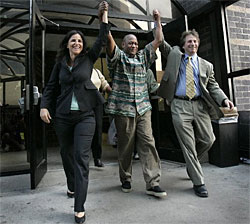


One Week Left Minus catastrophe, the low-key, small-initiative, narrow-tailored campaign of Gov. Rick Perry is highly likely to succeed, polls and political experts indicate. At a time when "change" is the blustery wind sweeping through elections nationwide, the calm breeze of "stay the course" looks like a winning message for the incumbent Republican in Texas. Of course, his message has hardly created a mandate – of the ballots cast, as many as two-thirds may be for someone else. "He's avoided the tide of change by being blessed with a divided opposition," said University of Texas political science professor Bruce Buchanan. What looked like an extraordinary race with an unusual combination of candidates has fizzled. Nothing has dramatically altered the landscape from January – not even the $52 million spent so far by the four major candidates for governor. The campaigns are playing out the final days before the Nov. 7 election, all adhering to their strategies to capture just enough voters to win – a majority is not required, and there is no runoff. But political analysts and consultants not affiliated with the candidates said that only Mr. Perry has met his goals, modest though they may have been. The challengers needed more cash, more time or fresh messages; the governor successfully avoided mistakes. |
|
Innocent Man Released after 25 years in Prison First the judge apologized, then the prosecutor. Finally, after 25 years in prison, 58-year-old Larry Fuller triumphantly walked out of the courthouse Tuesday a free man. "There's no bitterness," he said. "This is what life is about – trial and tribulation." But outside the courtroom, those who worked five years to secure the DNA testing that would prove his innocence had harsh words for the Dallas County justice system. They demanded that Mr. Fuller's exoneration become more than just the latest case of DNA testing righting a legal wrong from a generation ago. With 10 such exonerations in the last five years, Dallas law enforcement should undergo a critical self-examination and embrace tighter standards when relying solely on eyewitnesses, said lawyer Barry Scheck, co-director of the national Innocence Project. "Every time a case like Larry's occurs, we have to learn a lesson," Mr. Scheck said. But police and prosecutors say they understand that eyewitnesses are notoriously unreliable and that they no longer operate under the practices that resulted in Mr. Fuller's wrongful 1981 rape conviction and 50-year prison sentence. Dallas police have volunteered to be a test city to try out progressive new eyewitness identification techniques recommended by the Police Executive Research Forum. The proposed changes have been delayed until grant funding occurs, police officials said. Mr. Scheck also asked that prosecutors review the 10 recent exoneration cases to determine how they occurred and make sure the same mistakes are not repeated. Eyewitness accounts
Although eyewitness accounts have long been the backbone of the justice system and are considered by juries to be more reliable than circumstantial evidence, numerous studies have found they are notoriously inaccurate. Under the stress of an attack, witnesses' recollections can be distorted. Some experience "weapon focus," where they are fixated by the weapon they are being threatened with and remember little else. "Wouldn't you look at the barrel of a .45, if it was pointed at your face," said Dallas forensic psychologist Bill Flynn. Studies have also proved that witnesses of one race have trouble accurately describing an attacker of another race. And after a crime occurs, memories can be influenced by how detectives mold their questions and the manner in which they present a photo lineup of possible suspects, Dr. Malpass said. If Mr. Fuller's experience is like those of other recent Dallas exonerees, his release from prison is not a cure-all, and more struggles are almost sure to come. Greg Wallis, Billy Smith and Billy Miller, who all attended Mr. Fuller's hearing Tuesday, said they have had a hard time finding work and getting on with their lives since their release from prison. They are eligible for up to $250,000 compensation for their wrongful imprisonment, but the money can take months to receive and is taxed heavily. "I'm still struggling, trying to find a place to stay, employment, health insurance," said Mr. Smith, who served more than 19 years in prison. "I'm just out here, and I'm struggling." |
Today................ Click Here
Sports................ Click Here
Entertainment... Click Here
Business/Tech.. Click Here
ESPN.com.... Click Here
E!Online....... Click Here
CNET.com... Click Here

